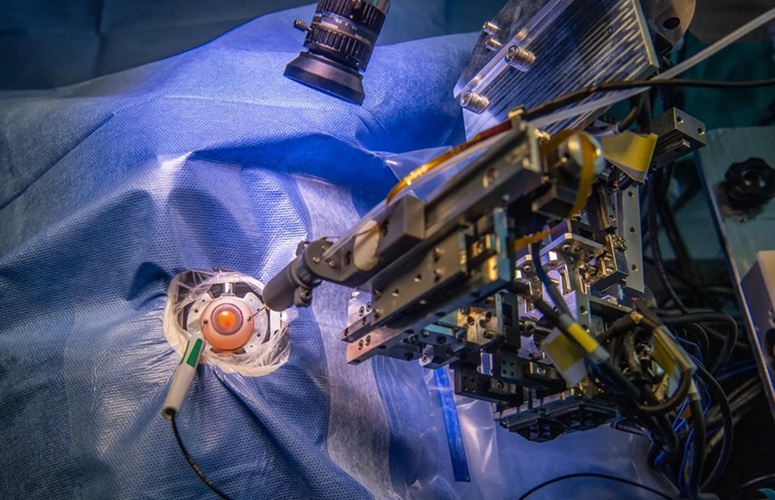Pfizer and BioNTech Begin Phase 2/3 Clinical Trial for COVID-19 Vaccine Candidate in Germany
|
By HospiMedica International staff writers Posted on 09 Sep 2020 |

Image: Pfizer and BioNTech Begin Phase 2/3 Clinical Trial for COVID-19 Vaccine Candidate in Germany (Photo courtesy of Pfizer)
Pfizer Inc. (New York, NY, USA) and Biopharmaceutical New Technologies (BioNTech Mainz, Germany) have received approval from the German regulatory authority, the Paul-Ehrlich-Institut, to conduct the Phase 2/3 clinical trial in Germany for their BNT162b2 COVID-19 vaccine candidate.
The BNT162 program is based on BioNTech’s proprietary mRNA technology and supported by Pfizer’s global vaccine development and manufacturing capabilities. Two of the companies’ four investigational vaccine candidates - BNT162b1 and BNT162b2 - had received Fast Track designation from the US Food and Drug Administration (FDA), based on preliminary data from Phase 1/2 studies that are currently ongoing in the US and Germany as well as animal immunogenicity studies. During preclinical and clinical studies, BNT162b1 and BNT162b2 emerged as strong candidates based on assessments of safety and immune response.
The study in Germany is part of the global pivotal Phase 2/3 program BioNTech and Pfizer initiated in July this year. The placebo-controlled trial evaluates the safety and efficacy of BNT162b2 in up to 30,000 participants between 18 and 85 years of age. The participants receive either BNT162b2 or placebo. The study will be conducted in approximately 120 sites globally, including regions with significant expected SARS-CoV-2 transmission. As of today, the trial enrollment has exceeded 25,000 participants.
BNT162b2 remains under clinical study and is currently not approved for distribution anywhere in the world. Assuming clinical success, Pfizer and BioNTech are on track to seek regulatory review for BNT162b2 as early as October 2020 and, if regulatory authorization or approval is obtained, currently plan to supply up to 100 million doses worldwide by the end of 2020 and approximately 1.3 billion doses by the end of 2021.
“A large, controlled Phase 3 study is a crucial prerequisite to prove the safety and efficacy of a vaccine,” said CEO and Co-founder of BioNTech, Ugur Sahin. “The integration of sites in Europe, and now especially in Germany, is aimed at supporting an approval in Europe.”
“It's great news that we have approval from the Paul-Ehrlich-Institut to extend this pivotal study to Germany and draw upon the expertise of the German scientific community to support our efforts,” said Peter Albiez, Pfizer Germany Country Manager.
Related Links:
Pfizer Inc.
Biopharmaceutical New Technologies
The BNT162 program is based on BioNTech’s proprietary mRNA technology and supported by Pfizer’s global vaccine development and manufacturing capabilities. Two of the companies’ four investigational vaccine candidates - BNT162b1 and BNT162b2 - had received Fast Track designation from the US Food and Drug Administration (FDA), based on preliminary data from Phase 1/2 studies that are currently ongoing in the US and Germany as well as animal immunogenicity studies. During preclinical and clinical studies, BNT162b1 and BNT162b2 emerged as strong candidates based on assessments of safety and immune response.
The study in Germany is part of the global pivotal Phase 2/3 program BioNTech and Pfizer initiated in July this year. The placebo-controlled trial evaluates the safety and efficacy of BNT162b2 in up to 30,000 participants between 18 and 85 years of age. The participants receive either BNT162b2 or placebo. The study will be conducted in approximately 120 sites globally, including regions with significant expected SARS-CoV-2 transmission. As of today, the trial enrollment has exceeded 25,000 participants.
BNT162b2 remains under clinical study and is currently not approved for distribution anywhere in the world. Assuming clinical success, Pfizer and BioNTech are on track to seek regulatory review for BNT162b2 as early as October 2020 and, if regulatory authorization or approval is obtained, currently plan to supply up to 100 million doses worldwide by the end of 2020 and approximately 1.3 billion doses by the end of 2021.
“A large, controlled Phase 3 study is a crucial prerequisite to prove the safety and efficacy of a vaccine,” said CEO and Co-founder of BioNTech, Ugur Sahin. “The integration of sites in Europe, and now especially in Germany, is aimed at supporting an approval in Europe.”
“It's great news that we have approval from the Paul-Ehrlich-Institut to extend this pivotal study to Germany and draw upon the expertise of the German scientific community to support our efforts,” said Peter Albiez, Pfizer Germany Country Manager.
Related Links:
Pfizer Inc.
Biopharmaceutical New Technologies
Latest COVID-19 News
- Low-Cost System Detects SARS-CoV-2 Virus in Hospital Air Using High-Tech Bubbles
- World's First Inhalable COVID-19 Vaccine Approved in China
- COVID-19 Vaccine Patch Fights SARS-CoV-2 Variants Better than Needles
- Blood Viscosity Testing Can Predict Risk of Death in Hospitalized COVID-19 Patients
- ‘Covid Computer’ Uses AI to Detect COVID-19 from Chest CT Scans
- MRI Lung-Imaging Technique Shows Cause of Long-COVID Symptoms
- Chest CT Scans of COVID-19 Patients Could Help Distinguish Between SARS-CoV-2 Variants
- Specialized MRI Detects Lung Abnormalities in Non-Hospitalized Long COVID Patients
- AI Algorithm Identifies Hospitalized Patients at Highest Risk of Dying From COVID-19
- Sweat Sensor Detects Key Biomarkers That Provide Early Warning of COVID-19 and Flu
- Study Assesses Impact of COVID-19 on Ventilation/Perfusion Scintigraphy
- CT Imaging Study Finds Vaccination Reduces Risk of COVID-19 Associated Pulmonary Embolism
- Third Day in Hospital a ‘Tipping Point’ in Severity of COVID-19 Pneumonia
- Longer Interval Between COVID-19 Vaccines Generates Up to Nine Times as Many Antibodies
- AI Model for Monitoring COVID-19 Predicts Mortality Within First 30 Days of Admission
- AI Predicts COVID Prognosis at Near-Expert Level Based Off CT Scans
Channels
Critical Care
view channel
Light-Based Technology to Measure Brain Blood Flow Could Diagnose Stroke and TBI
Monitoring blood flow in the brain is crucial for diagnosing and treating neurological conditions such as stroke, traumatic brain injury (TBI), and vascular dementia. However, current imaging methods like... Read more
AI Heart Attack Risk Assessment Tool Outperforms Existing Methods
For decades, doctors have relied on standardized scoring systems to assess patients with the most common type of heart attack—non-ST-elevation acute coronary syndrome (NSTE-ACS). The GRACE score, used... Read moreSurgical Techniques
view channel
Robotic Assistant Delivers Ultra-Precision Injections with Rapid Setup Times
Age-related macular degeneration (AMD) is a leading cause of blindness worldwide, affecting nearly 200 million people, a figure expected to rise to 280 million by 2040. Current treatment involves doctors... Read more
Minimally Invasive Endoscopic Surgery Improves Severe Stroke Outcomes
Intracerebral hemorrhage, a type of stroke caused by bleeding deep within the brain, remains one of the most challenging neurological emergencies to treat. Accounting for about 15% of all strokes, it carries... Read morePatient Care
view channel
Revolutionary Automatic IV-Line Flushing Device to Enhance Infusion Care
More than 80% of in-hospital patients receive intravenous (IV) therapy. Every dose of IV medicine delivered in a small volume (<250 mL) infusion bag should be followed by subsequent flushing to ensure... Read more
VR Training Tool Combats Contamination of Portable Medical Equipment
Healthcare-associated infections (HAIs) impact one in every 31 patients, cause nearly 100,000 deaths each year, and cost USD 28.4 billion in direct medical expenses. Notably, up to 75% of these infections... Read more
Portable Biosensor Platform to Reduce Hospital-Acquired Infections
Approximately 4 million patients in the European Union acquire healthcare-associated infections (HAIs) or nosocomial infections each year, with around 37,000 deaths directly resulting from these infections,... Read moreFirst-Of-Its-Kind Portable Germicidal Light Technology Disinfects High-Touch Clinical Surfaces in Seconds
Reducing healthcare-acquired infections (HAIs) remains a pressing issue within global healthcare systems. In the United States alone, 1.7 million patients contract HAIs annually, leading to approximately... Read moreHealth IT
view channel
Printable Molecule-Selective Nanoparticles Enable Mass Production of Wearable Biosensors
The future of medicine is likely to focus on the personalization of healthcare—understanding exactly what an individual requires and delivering the appropriate combination of nutrients, metabolites, and... Read moreBusiness
view channel
Philips and Masimo Partner to Advance Patient Monitoring Measurement Technologies
Royal Philips (Amsterdam, Netherlands) and Masimo (Irvine, California, USA) have renewed their multi-year strategic collaboration, combining Philips’ expertise in patient monitoring with Masimo’s noninvasive... Read more
B. Braun Acquires Digital Microsurgery Company True Digital Surgery
The high-end microsurgery market in neurosurgery, spine, and ENT is undergoing a significant transformation. Traditional analog microscopes are giving way to digital exoscopes, which provide improved visualization,... Read more
CMEF 2025 to Promote Holistic and High-Quality Development of Medical and Health Industry
The 92nd China International Medical Equipment Fair (CMEF 2025) Autumn Exhibition is scheduled to be held from September 26 to 29 at the China Import and Export Fair Complex (Canton Fair Complex) in Guangzhou.... Read more















